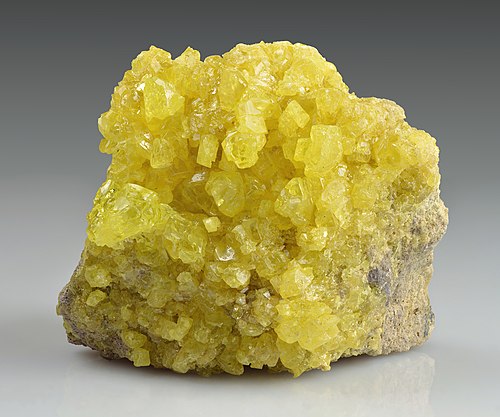Facts for Kids
Sulfur is a yellow, nonmetallic element known for its distinct odor and multiple industrial applications, particularly in fertilizers and chemicals.
Overview
Natural Sources Of Sulfur
Uses Of Sulfur In Industry
Chemical Properties Of Sulfur
Safety And Handling Of Sulfur
Environmental Impact Of Sulfur
Biological Importance Of Sulfur
Historical Significance Of Sulfur
Sulfur Compounds And Their Applications

Inside this Article
Mount St. Helens
Climate Change
Atomic Number
Temperature
Paracelsus
Hydrogen
Function
Did you know?
🟡 Sulfur is the 16th element on the periodic table and is represented by the symbol 'S'.
🌍 Naturally occurring sulfur can be found in volcanic regions and near hot springs.
💧 Sulfur is insoluble in water but soluble in carbon disulfide, benzene, and other organic solvents.
⚗️ Sulfur is a key ingredient in the production of sulfuric acid, one of the most widely used industrial chemicals.
🌿 Sulfur plays an essential role in plant nutrition and is a component of amino acids and vitamins.
🔥 Elemental sulfur burns with a blue flame and produces sulfur dioxide, which has a pungent odor.
🎭 Sulfur is used in the vulcanization of rubber to improve its durability and elasticity.
🐤 The elemental form of sulfur is essential in the production of fertilizers, helping to enhance crop yields.
🏭 Sulfur compounds are utilized in the creation of pesticides, fungicides, and herbicides.
🔬 Sulfur is also applied in the pharmaceutical industry for antibiotics and other medicinal compounds.
Introduction
This means it has 16 protons. So, when you see the symbol "S," you know it stands for sulfur. Sulfur is important for life and can be found in many forms. It’s often used to make things like matches, fireworks, and even batteries! 🎆
It smells like rotten eggs when burned, which helps people detect it. Sulfur is found in nature, especially near volcanoes and hot springs, making it a fascinating element to explore! 🌋
Natural Sources Of Sulfur
It often appears around volcanoes and hot springs, where it's released into the air or water. One of the biggest sources is the "Ring of Fire," a region around the Pacific Ocean known for volcanoes like Mount St. Helens in the USA and Mount Fuji in Japan! 🌋
Other natural sources include minerals found in the Earth's crust, like gypsum and pyrite. Sulfur is also part of our bodies and can be found in various foods like garlic 🧄, onions, and eggs! 🥚
Uses Of Sulfur In Industry
One of its main uses is in making sulfuric acid, which is the most widely produced chemical in the world. Moves like fertilizers to help crops 🌾 grow better use sulfur! It helps plants absorb nutrients. Sulfur is also essential in making rubber for tires and other products. 🛞
Moreover, it is used to create pesticides that protect plants from pests. It's a key ingredient in many products, like detergents and even some medicines! 💊
Chemical Properties Of Sulfur
In nature, sulfur can exist in various forms called allotropes, the most common being rhombic sulfur. This means its atoms arrange in different ways. Sulfur can combine with other elements to form compounds such as sulfur dioxide (SO₂) and hydrogen sulfide (H₂S). It can burn in the air, producing more of these compounds. 🔥
When powdered, sulfur can ignite easily, and it helps create colorful explosions in fireworks! 🎇
Safety And Handling Of Sulfur
️ When working with sulfur, wearing safety goggles and gloves is important to avoid irritation. Sulfur can produce poisonous gases, like sulfur dioxide and hydrogen sulfide, if burned. 😷
It's best to work with sulfur in well-ventilated areas. Always follow safety instructions when working with chemicals and ask adults for help! 🧑
🏫 Learning about sulfur can be exciting, but being safe is the most important part! Safety first! 🛡
️
Environmental Impact Of Sulfur
When it burns, it creates sulfur dioxide, which can contribute to acid rain. This is harmful to plants, fish, and buildings! 🏛
️ But sulfur also plays a role in the Earth's natural cycles, helping produce important nutrients. 🌱
Sulfur-containing compounds can help clean polluted environments. Scientists study sulfur in the atmosphere to understand climate change better! It’s essential to strike a balance between using sulfur and protecting our planet! ⚖
️
Biological Importance Of Sulfur
All living things need it! Sulfur is a vital part of some amino acids, which are the building blocks of proteins. Proteins help our bodies grow, repair, and function properly. 💪
Animals and plants use sulfur to produce vitamins, like vitamin B1, which helps us get energy. Some bacteria even use sulfur to make their own food! So, when we breathe in and eat, we take in this important element without even knowing it! 🌱
Historical Significance Of Sulfur
️ Ancient Egyptians used it for mummification, and it was called "brimstone" in old texts. In the 16th century, great thinkers like Paracelsus studied sulfur, leading to its use in medicine. ⚗
️ In the 19th century, it became crucial for making gunpowder, which played roles in wars. ⚔
️ Today, it is still connected with many historical events, like the search for new materials and resources! Sulfur's history shows us how essential it has been to humanity! 🌎
Sulfur Compounds And Their Applications
One common one is sulfur dioxide (SO₂), which is used to preserve foods and make wine. 🍷
Another important compound is hydrogen sulfide (H₂S), known for its strong smell, like rotten eggs! Yuck! Hydrogen sulfide can be dangerous, so it must be handled carefully! 💨
Sulfur compounds have many applications, like in making fertilizers, disinfectants, and even oils for machinery. Many of these compounds make our lives easier and keep our environments clean! 🌱

